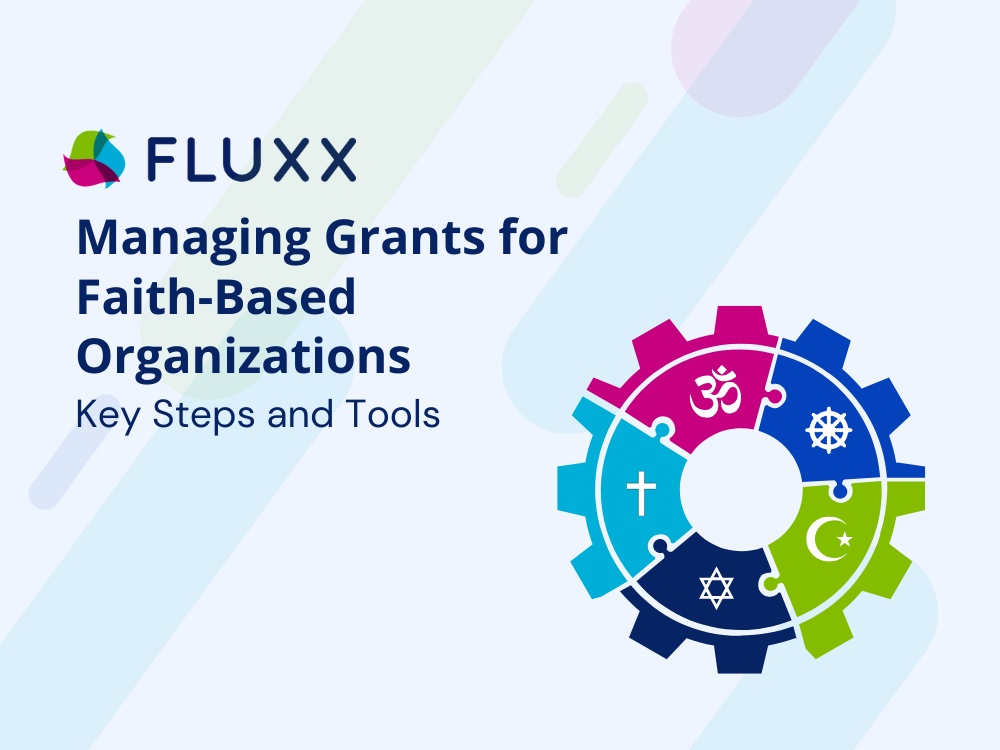What is Grants.gov and How Do I Use It?
Discover what Grants.gov is, how it works, the types of grants available, and how to use the platform effectively. Learn how Fluxx integrates with...
Be the first to know about new Fluxx grants management resources, blog articles and podcasts.


Faith-based organizations are vital in the solution of social problems, community services, and spiritual development. Grants are an important resource to help them achieve their goals. However, grant management for faith-based organizations can be quite complicated with special requirements and responsibilities.
The organizational understanding of what faith-based grants are, who makes them special, and how these funds should be managed is what makes a great organization successful. The purpose of this guide is to explore just what faith-based grants are, in what way they are different from grants for religious organizations, and how tools such as Fluxx can help simplify the grant management process.
A faith-based grant is a form of financial awarding to organizations whose missions and programs are guided because of faith values. These may be funded through a government agency, private foundation, or religious entity for community-oriented projects.
Faith-based grants typically fund programs such as:
While the grants are focused on faith-based missions, they consider a wide range of community programs.
While both faith-based grants and religious organization grants support initiatives based on spiritual values, they differ in scope, purpose, and application. These differences shape eligibility requirements, the use of funds, and the audience to be served by the grants.
Faith-based grants tend to target entities serving not only the specific congregation but also a population with general needs. Examples include faith-affiliated nonprofit organizations operating a food pantry for underserved populations. Most of these grants tend to fall into community needs that are tangible, involving aspects such as education, disaster relief, or healthcare, and exercise inclusivity in their scope.
On the other hand, religious organization grants often narrowly address specific needs for a house of worship or its congregation, such as renovation of a church, youth ministry programs, or religious education that is directly related to the mission of the institution.
Understanding such distinctions helps organizations identify the appropriate funding opportunities for their programs and shapes their applications accordingly.
Faith-based grants come in many shapes and sizes to meet the unique missions of such organizations. These grants address both operational needs for organizations and their capacity to provide valued programs to communities.
These different types of funding enable faith-based organizations to pursue their missions and meet a multitude of needs in society.
Faith-based grants vary in application from small, community-based providers to large, nationally recognized organizations, each playing a role in service delivery and community support. Knowing what types of organizations are eligible will help position applicants for success.
By aligning their applications with the priorities of grantors, these organizations can improve their chances of receiving funding.
Faith-based grants require an individual or team to navigate the intricacies of funding requirements while ensuring smooth program operations. Grant managers are essential in ensuring full transparency, compliance, and efficiency during a grant’s life cycle.
Through these responsibilities, grant managers serve as stewards of the organization’s mission, ensuring that funding is used strategically for maximum impact.
Fluxx Grant Management Software handles all things grant management, giving faith-based organizations more time to focus on their missions rather than administrative burdens. Its intuitive design and robust functionality streamline every step of the grant management process.
These features allow faith-based organizations to manage their grants efficiently, freeing up resources to focus on serving their communities.
Faith-based grants provide essential resources for organizations rooted in faith values to advance their missions. By understanding the unique characteristics of these grants and leveraging powerful tools like Fluxx grant management software, organizations can simplify the process and maximize their impact.
Learn how Fluxx can make managing your grants easier—request a demo today!
Discover what Grants.gov is, how it works, the types of grants available, and how to use the platform effectively. Learn how Fluxx integrates with...
Discover what a grant management system is, how it works, and why it's essential for organizations managing grants. Learn about the benefits and key...
Discover how state governments manage grants, the unique challenges they face compared to other sectors, and why effective grant management is...
Be the first to know about new Fluxx grants management resources, blog articles and podcasts.